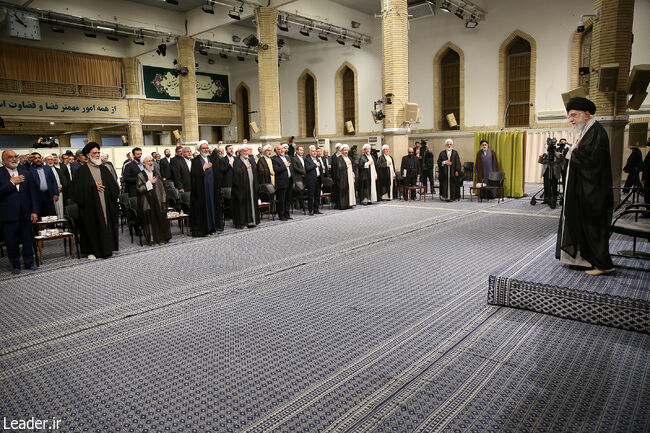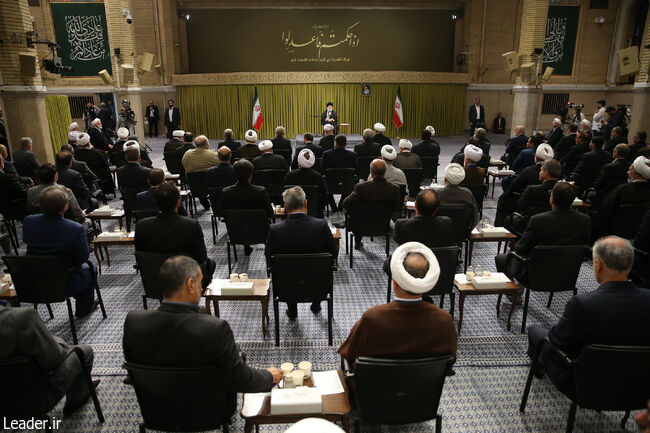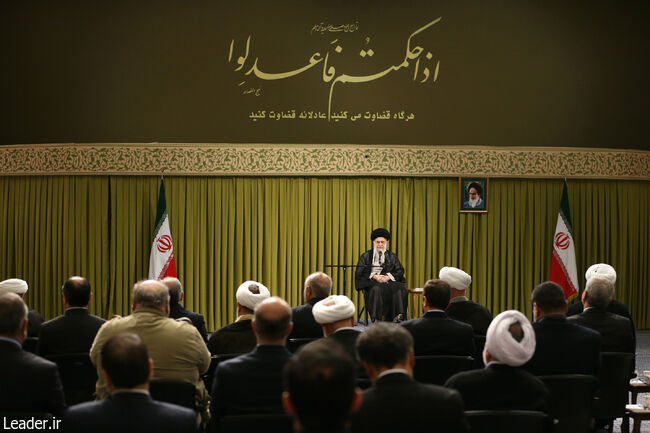In a significant meeting with Judiciary officials on 22nd June 2024, the Leader of the Islamic Revolution underscored the pivotal responsibilities of the Judiciary, which include resolving people's issues and disputes based on justice and preventing breaches of legal red lines. He emphasised, "The primary duty of the judiciary is to execute justice with unwavering courage and impartiality."
At the outset of the meeting, Ayatollah Imam Khamenei paid tribute to the memory of the martyrs in the judiciary, including Martyr Beheshti and Martyr Raeisi, who had distinguished records in the judiciary. He expressed his heartfelt gratitude for the dedication of the institution's chief, officials, judges, and its commendable staff.
The Leader of the Islamic Revolution underscored that the Quran and other Islamic sources place few principles on a pedestal as high as "justice," considering courage a prerequisite for its implementation. He stated, "As Imam Sajjad (a.s.) has articulated, the judiciary should act in a manner that its adversaries would feel secure from oppression and injustice and deter its close allies from taking unfair sides. This is a crucial matter that will uphold the spiritual and psychological security of the people."
Ayatollah Khamenei further elaborated that a strategic, program-oriented approach and the development of robust documents are not just beneficial but crucial for the transformation within the judiciary. He stated, "These documents must be implemented with utmost urgency to have a tangible effect on important judicial indicators." He called for a swift reduction in the time for handling cases, strengthening and ensuring the precision of rulings by the lower courts, which would lead to a significant decrease in the overturning of verdicts during the appeals process and a substantial reduction in reports and complaints to the Inspectorate Organization. These are among the essential indicators that should improve with the immediate implementation of recommendations in the judiciary documents.
The Leader of the Islamic Revolution said that the backlog of judicial cases has put pressure on judges and has potentially reduced the precision of rulings. He said, "To solve the significant problem of the backlog of judicial cases, original thinking would be necessary."
Two other recommendations by the Leader to the judiciary officials were that judicial knowledge for all judges should be enhanced by utilising the capacities of the University of Judicial Sciences and strengthening the volunteer forces.
Ayatollah Khamenei expressed concern about the slow pace of handling cases involving detainees, which prolongs temporary detentions. He said, "The fate of such individuals should be determined sooner so that no one has to endure hardship in prison due to prolonged case processing."
The Leader of the Revolution also mentioned the unresolved issue of some prisoners in debt, stating, "Even if they remain in prison for their entire lives, some individuals are unable to repay their debts, and this problem needs to be addressed."
The Leader of the Revolution emphasised that judges should rely on domestic laws rather than Western human rights sources. He also mentioned that the head of the judiciary should continue field visits, which could ensure the implementation of hopeful decisions made during these visits.
He summarised this section of his remarks, thus, "Act in a way that the public perceives the judiciary as a court of justice and a centre for impartially upholding rights."
In concluding his remarks, the Leader of the Revolution made an essential recommendation to the candidates in the presidential elections. After praising the television election programs as effective in familiarising the public with various perspectives, he said, "The discussions or statements of candidates on television or elsewhere should not lead them to resort to antagonistic or divisive rhetoric to overcome their competitors."
He added, "It is assumed that all the candidates love Iran and the Islamic Republic because they aspire to become president within this system and serve the people. Therefore, they should not speak in a way that pleases the enemy."
At the beginning of the meeting, the head of the judiciary described the continuing formation of joint committees between the judiciary and the government as one of the most desirable events of the past year.
Mr Ejei outlined that among the most important actions of this institution were issuing the updated document on the transformation of the judiciary, collaborating with authorities to reform economic laws and prevent the bankruptcy of large manufacturing plants, serious engagement to resolve legal issues regarding people's land; the enhancement of field supervision over customs, ports, and warehouses; intelligent monitoring of urban activities; and a significant reduction in unauthorised constructions. He said that over 400,000 public meetings had been held by judiciary officials nationwide. They were making concerted efforts in judicial diplomacy by collaborating with the Human Rights Headquarters and the Ministry of Foreign Affairs".



